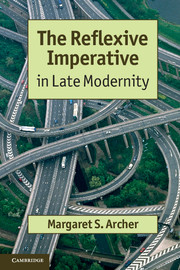Book contents
- Frontmatter
- Contents
- Figures
- Acknowledgements
- Introduction
- 1 A brief history of how reflexivity becomes imperative
- 2 The reflexive imperative versus habits and habitus
- 3 Reconceptualizing socialization as ‘relational reflexivity’
- 4 Communicative reflexivity and its decline
- 5 Autonomous reflexivity: the new spirit of social enterprise
- 6 Meta-reflexives: critics of market and state
- 7 Fractured reflexives: casualties of the reflexive imperative
- 8 Conclusion
- Methodological appendix
- Index
- References
2 - The reflexive imperative versus habits and habitus
Published online by Cambridge University Press: 05 June 2012
- Frontmatter
- Contents
- Figures
- Acknowledgements
- Introduction
- 1 A brief history of how reflexivity becomes imperative
- 2 The reflexive imperative versus habits and habitus
- 3 Reconceptualizing socialization as ‘relational reflexivity’
- 4 Communicative reflexivity and its decline
- 5 Autonomous reflexivity: the new spirit of social enterprise
- 6 Meta-reflexives: critics of market and state
- 7 Fractured reflexives: casualties of the reflexive imperative
- 8 Conclusion
- Methodological appendix
- Index
- References
Summary
Introduction
The role of habit – habitual, routinized or customary action – has had an extremely long run in social theory. We are indebted to Charles Camic for demonstrating that ‘habits’ played a bigger part in classical theorizing than is usually acknowledged. His definition is also nicely straightforward and Catholic: ‘the term “habit” generally denominates a more or less self-actuating disposition or tendency to engage in a previously adopted or acquired form of action’. However, it is hard to agree with his bold claims that ‘contemporary sociology has virtually dispensed with the concept’; that ‘there is no need to carry this investigation forwards in time’ – meaning beyond the first decades of the twentieth century – or to accept that ‘the end of habit’ in social theory resulted from a successful take over by behavioural psychology abetted by Talcott Parsons’ substitution of normative regulation for habituation. Even harder to endorse is his judgement on reflexivity, the usurper of habitual action: ‘So obviously appropriate has the reflective model come to appear that those who employ it seldom concern themselves with providing a reasoned defence, or even an explicit justification, for their practice of uniformly casting human conduct into this one mold’. In what follows I want to question firstly, the death of habit; secondly, to query the absence of good reason for attending to reflexivity today; and thirdly, to doubt whether ‘habit’ and ‘reflexivity’ have stood in a zero-sum relationship over the last hundred years of theorizing.
Writing in 1986 and from translation, it was understandable that Camic did not detect the nascent revitalization of pragmatism but less so that he had no intimation that Bourdieu's reformulation of habitus was already becoming what Scott Lash dubbed the only cultural game in town (there is a single reference to reproduction). There were very good reasons indeed, which strengthened over the last two decades of the twentieth century, for paying more attention to reflexive action, although those I will advance are not identical to Alexander's prescience. Finally, what has predominated amongst social theorists is far from an endorsement of ‘one mold’ of (reflexive) action, but rather diverse efforts to hybridize habit and reflexivity.
- Type
- Chapter
- Information
- The Reflexive Imperative in Late Modernity , pp. 47 - 86Publisher: Cambridge University PressPrint publication year: 2012



